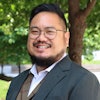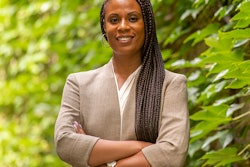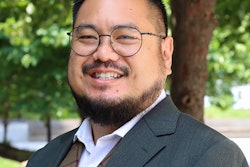Title: Professor, Communication Arts, University of Wisconsin-Madison; and Director, Asian American Studies Program, University of Wisconsin-Madison
Tenured: Yes
Age: 40
Education: B.A., media studies and Asian studies, Pomona College; M.A., mass communication, Indiana University; and Ph.D., communication, University of Southern California
Career mentors: Dr. Sarah Banet-Weiser, University of Southern California; Dr. Radhika Parameswaran, Indiana University; and Dr. Sue Zaeske, University of Wisconsin-Madison
Words of wisdom/advice for new faculty members: “Enjoy every stage of your academic career. Don’t wait around until you feel more established or have more time, because the reality is that there’s always new challenges at each stage. Find ways to take pleasure in your work now, because this is such a rewarding job.”
For as long as she can remember, Dr. Lori Kido Lopez has been passionate about media and Asian American social justice. And that’s in part because she sees herself as an activist — someone looking to challenge society’s prevailing injustices.
“I could have seen myself becoming a documentary filmmaker or a community organizer, but it was in graduate school that I became really passionate about the idea of making a difference through teaching and research,” says Lopez, a professor of communications at the University of Wisconsin-Madison and director of the school’s Asian American Studies Program. Her research focuses on the intersection of race and media, specifically on how Asian Americans are working to improve their representation in mainstream media and to control their own narratives. Lopez’s work tracks this progress amid the ongoing physical violence directed toward Asian Americans in recent years.
As a mixed-race person — Lopez is Japanese and white, and she is married to a Latino — she brings her diverse racial identities to the lens of her research and work, and that has proved useful to many of her students. “I talk about being mixed-race with my students a lot,” she says. ‘A lot of our students are mixed race, and I think that’s an important perspective. I hope that when I talk about and bring my own personal experiences to the classroom, I hope it’s meaningful to them.”
An expert on Asian American media and activism, Lopez teaches courses like “Race and Media” but to also administer the day-to-day Asian American Studies Program, which is small but growing by leaps and bounds. “I’ve always been interested in academic administration,” says Lopez. “I was very excited to step in[to] a leadership position like this, and I love it. It’s been the highlight of my career.”
After she earned her Ph.D. in 2012 from the University of Southern California, the Portland, Oregon, native was hired as an assistant professor at the University of Wisconsin-Madison. Five years later, Lopez became tenured. “I fell in love with Madison and my department and my academic community, so I have been here for the last 12 years,” says Lopez.
Shortly after she arrived to Madison, Lopez got involved with Freedom, Inc., a Black and Southeast Asian nonprofit organization that works with low- to no-income communities of color. The organization’s mission, according to its website, “is to achieve social justice through coupling direct services with leadership development and community organizing that will bring about social, political, cultural, and economic change resulting in the end of violence against women, gender-non-conforming and transgender folks, and children within communities of color. “
In recent years, Lopez has turned her activism and focus inward. She leads several diversity, equity, and inclusion (DEI) committees and has been spending “time thinking about to make the university a more equitable and just place.”
“Because I am interested in activism and social justice, I identify as an activist,” says Lopez, who has written and edited several books including Micro Media Industries: Hmong American Media Innovation in the Diaspora. As she takes a panoramic look at the representation of Asian Americans in the media, Lopez has reasons to be optimistic, but cautions that there is still much work to be done. “I think there is a lot to celebrate and be excited about, although there is always more to work for, and people don’t know as much about independent media that I wish they did.” As protests continue to evolve, Lopez says that digital activism will continue to play a critical role in connecting people to social justice issues.
“I think it’s been really encouraging that we’ve moved from thinking that digital activism is something just for lazy people to understanding that just tweeting something or retweeting something actually has the power to change the world,” says Lopez, adding that the social media platforms activists use will inevitably change, particularly as more people retreat from X, formerly known as Twitter.
Helping students understand the connection between activism and media is the reason Lopez opted to become a professor in the first place. “I wanted to be able to use my classes to teach students about issues of power, and difference and equality, and I thought [the university] was a space where I could make a big difference,” says Lopez.















